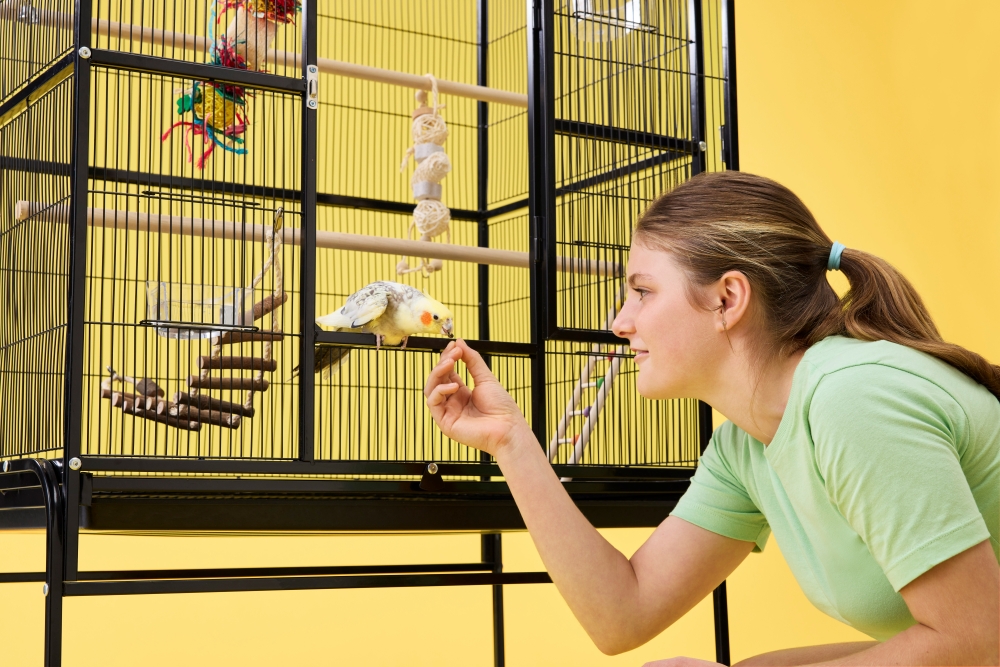Birds are wonderful, talkative and interactive pets that can get into mischief. Bird-proofing your home is essential to help keep them safe and healthy.
If you’ve decided to introduce a bird to your family, here’s what you’ll need to do before bringing them home.
Be aware of potential hazards for your bird
Aerosol dangers
Birds have very sensitive respiratory systems. Aromas such as scented candles and air fresheners can be harmful to your new pet, so it’s important to avoid using these once they’re home.
Insect sprays and the fumes released from cooking with Teflon can be fatal, which is why their enclosure should be far away from high-traffic zones like the kitchen.
Chewable hazards
As birds are known chewers, it’s important to keep potential dangers away from their curious beaks. Electrical cords are of particular concern and you need to make sure that your bird won’t be able to access them.
You’ll also need to be careful about what your bird can chew – a windowsill might be appealing to them, but it may have been treated with paints or treatments that could be toxic for your bird.
Toxic food and plants
Make sure your bird won’t have access to toxic foods like onions, garlic, or avocado. Similarly, there are several plants that can cause issues for your bird – common varieties to watch out for are lilies, ivy, parsley, jasmine, daffodils and honeysuckle.
Place your bird’s cage in a safe space
Due to birds’ sensitivities to some of the aromas mentioned above, you’ll need to take this into account when choosing the space for their enclosure.
Find a spot that is quiet and can be nice and dark for bedtime. Ideally, their cage or aviary will sit beside a window so your bird can enjoy the sunlight and watch what’s happening outside. That being said, you need to be very careful that your bird won’t be at risk of getting too hot or too cold. Be mindful of draughts and your bird spending time in direct sunlight as these elements can be harmful to them.
Get all the essentials before your bird comes home
Before your bird arrives home, you’ll want to make sure you have everything they need on hand.
Food
Stock your pantry full of suitable bird pellets that are formulated to deliver all your bird’s nutritional needs. Different species of birds have different dietary requirements, so make sure you choose one that’s appropriate for your new pet.
Along with the pellets, which should make up about 80% of your bird’s diet, you should also stock your fridge with fresh fruits and veggies, as these will make up 15% of your new pet’s menu.
It’s also good to pick up millet, which will keep their beak active and well maintained.
Bowls
Of course, you’ll need to pick up bowls for food as well as a bowl or dripper for their water.
Toys
A selection of bird-friendly toys should also be included in your starter kit. You’ll want toys such as ladders and perches that your bird can climb on – these are great for keeping them entertained. A mirror may remind them how good-looking they are.
Feel free to chat to your local Petbarn team members for advice on finding the right accessories for your pet bird.
Know your nearest veterinarian
Emergencies can happen anytime, so it’s useful to know the location and details of your closest Greencross Vets clinic and emergency veterinary hospital in advance. This can help avoid panic in an emergency – particularly helpful while your bird is settling into their new home. Stick the address on your fridge or save the location in your phone where it’s readily accessible.
Whether this is your first ever pet or first bird, taking the time to prepare for your bird’s arrival and bird proofing your home will make their settling in phase so much smoother. If you need any more advice, feel free to talk to your local Petbarn team members.


